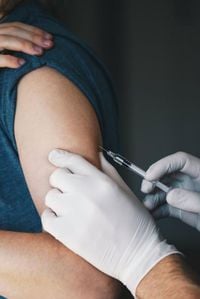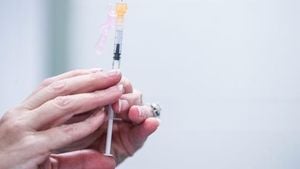In a move that has sent shockwaves through the American public health community, Robert F. Kennedy Jr., the U.S. Secretary of Health and Human Services (HHS), has dramatically reshaped the nation's vaccine landscape, stirring fears of a looming public health crisis. Over the past several months, Kennedy's actions have dismantled long-standing trust in vaccines and altered access to critical immunizations, prompting experts to warn of devastating consequences both domestically and globally.
Last month, Kennedy abruptly fired all 17 members of the Centers for Disease Control and Prevention's (CDC) Advisory Committee on Immunization Practices (ACIP), replacing them with a new panel largely composed of individuals lacking expertise in vaccines, infectious diseases, or epidemiology. This newly constituted group swiftly voted to ban thimerosal—a mercury-containing preservative used sparingly in some flu vaccines—from all influenza immunizations, a decision that has alarmed public health experts and advocates.
Thimerosal has been the subject of controversy for decades, largely fueled by anti-vaccine activists who falsely linked it to autism. Scientific research has thoroughly debunked this connection, and the preservative was removed from nearly all childhood vaccines by 2001 as a precautionary measure to address vaccine hesitancy. Today, only about 4 to 5 percent of flu vaccine recipients in the U.S. receive doses containing thimerosal, typically in multi-dose vials.
Despite the overwhelming evidence supporting its safety, the new ACIP panel, influenced by anti-vaccine rhetoric, voted to no longer recommend flu vaccines containing thimerosal. This decision was propelled by a presentation from Lyn Redwood, a nurse and former head of the Children's Health Defense—an anti-vaccine organization founded by Kennedy himself—who cited discredited studies and made false claims about the preservative's risks. Pediatrician Cody Meissner, the sole dissenting voice on the panel, highlighted that the risk from influenza far outweighs any nonexistent risk from thimerosal, emphasizing the dangers of undermining vaccine confidence.
Experts caution that this ban could have significant repercussions. It may drive up flu vaccine prices and reduce availability, making it harder for vulnerable populations to obtain protection. Moreover, the move risks reigniting unfounded fears about vaccine safety, potentially eroding public trust at a critical time.
Kennedy's campaign against vaccines extends beyond thimerosal. He has canceled funding for the development of bird flu vaccines for humans and withdrawn U.S. support from Gavi, the global alliance that vaccinates millions of children worldwide. His skepticism toward vaccines has also sown doubt about the measles vaccine, despite its proven safety and effectiveness. Kennedy has falsely claimed that the measles vaccine was never fully tested and contains "a lot of aborted fetus debris," statements that have no basis in scientific fact. Furthermore, he has directed the CDC to develop guidelines for alternative measles treatments, undermining established public health protocols.
These actions have resulted in a cascade of concerning changes. The CDC's recommendations for COVID-19 vaccines have been softened; healthy children and pregnant people are no longer advised to receive the shots, with the language shifting from "should" to "may" for children and the recommendation being completely removed for pregnant individuals—who are at higher risk for severe illness. This shift aligns with the broader anti-vaccine agenda Kennedy appears to be advancing within federal health agencies.
The implications of these policy changes are profound. Vaccine experts warn that if vaccine recommendations continue to be weakened or removed, the consequences could be dire. Dorit Reiss, a professor at UC Hastings College of Law, believes Kennedy's ultimate goal is to make most or all childhood vaccines inaccessible, potentially ending programs like Vaccines for Children, which provides $5 billion annually to cover immunizations for nearly half of all U.S. children.
Such developments could trigger a mass exodus of vaccine manufacturers from the U.S. market. Paul Offit, professor of pediatrics at the University of Pennsylvania, explains that vaccines are not a major profit center for pharmaceutical companies compared to other drugs. However, if vaccines become subject to increased litigation or are removed from compensation programs without causal evidence—such as the recent fast-tracked inclusion of autism as a compensable vaccine injury despite decades of research disproving any link—manufacturers may find it untenable to continue production and distribution domestically.
History offers a stark warning. Between 1980 and 1990, the number of vaccine manufacturers in the U.S. plummeted from 18 to 4, largely due to litigation fears and rising costs. The result was skyrocketing vaccine prices and reduced availability, a scenario public health officials fear could repeat.
The human cost of declining vaccination rates is already becoming apparent. The year 2025 has seen some of the worst measles outbreaks in decades, a sixfold increase in whooping cough cases from 2023 to 2024, and the detection of poliovirus in wastewater in 2022. Peter Hotez, dean for the National School of Tropical Medicine at Baylor College of Medicine, warns of the potential resurgence of diseases like pertussis and Hib meningitis, illnesses that had been largely controlled through vaccination.
Modeling studies coauthored by Hotez suggest that a mere 10 percent decline in measles vaccination could lead to 11.1 million cases over 25 years, with devastating consequences for public health. Yet, despite these threats, most parents remain supportive of vaccines. A recent Harvard T.H. Chan School of Public Health poll found that 91 percent of parents believe vaccines are safe for most children, and many continue to vaccinate.
Still, the mainstreaming of disinformation and the erosion of trust in vaccines pose a serious threat to herd immunity—the critical protection that helps shield those who cannot be vaccinated, such as infants and immunocompromised individuals. Lower vaccination rates increase infection rates, leading to more severe illness, increased absenteeism from work and school, greater strain on healthcare systems, and ultimately, more deaths.
The current absence of a CDC director further complicates the situation. By law, ACIP recommendations require approval from the CDC director before becoming official. With no director in place, Kennedy effectively holds the power to approve or reject vaccine guidelines, consolidating control over immunization policy in a way that raises concerns about impartiality and public health priorities.
Public health professionals and lawmakers are calling for accountability. Kennedy recently faced questioning before a House subcommittee, where his evasive responses left many unsatisfied. There is growing pressure for the Senate, which confirmed him, to demand explanations for his undermining of vaccine programs and to ensure that science-based policies are restored.
Fiona Havers, a physician and epidemiologist who resigned from the CDC in protest of the ACIP firings, described the recent committee meeting as "a travesty" and a "complete farce," highlighting the bypassing of standard CDC review processes and the disregard for evidence-based decision-making.
Despite the bleak outlook, experts like Offit and Hotez remain cautiously hopeful that the federal government will intervene before vaccination rates plummet to catastrophic levels. However, rebuilding trust and repairing the damaged vaccine infrastructure will be a long and arduous process. Dorit Reiss warns that it will take "decades, not years" to fix the harm inflicted on public health institutions and to restore confidence in vaccines.
As the nation grapples with these challenges, the stakes could not be higher. The decisions made in conference rooms and government offices today will shape the health of millions for years to come. The question remains: will America rise to protect its most vulnerable, or will it succumb to the consequences of eroding science and trust?




